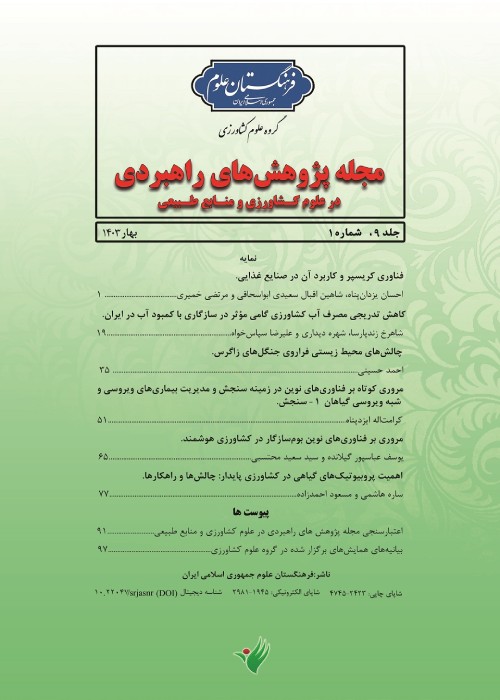Documentary Analysis of New Irrigation and Agricultural Water Technologies and their Possible Application in Iran
Innovative and sustainable agricultural water management is critical in adaptation programs to climate variability and change, and emerging, eco-friendly irrigation technologies are expected to play a key role in the world's future water and food security. The current study was carried out with the aim of discussing pros and cons of new irrigation and agricultural water technologies in the world, and the possibility of application of these technologies in Iran. These techniques are classified into seven categories: smart technology, nanotechnology, greenhouse technology, superabsorbent technology, cloud seeding technology, deep water technology, and seawater desalination technology. These technologies are analyzed in terms of economics, water and energy usage, and certain environmental factors (such as toxicity and greenhouse gas emissions). The state-of-the-art of modern irrigation and agricultural water technologies in Iran is examined, and the issue of their domestic application is matched with the country’s potentials. According to documentary studies, our country is at the beginning of the road in terms of intelligent technologies for agricultural water management and nanotechnology, and further study is required to employ these technologies. However, intelligent irrigation management utilizing crop growth and yield models, mobile phone applications, and micro-irrigation implementation was proposed as a feasible solution. The use of silver nanoparticles was suggested for the disinfection of water in remote areas, and the use of titanium dioxide for areas that do not have power supply problems. Employing the vertical farming is not recommended in the country due to the problems of electrical power supply and air pollution and presence of unlimited arable land. The technology of artificial light and solar panels has been adopted in Iran and more research is needed to justify their applications in greenhouses. Cloud seeding, deep water, and seawater desalination technologies have become indigenous to Iran. Cloud seeding is ineffective to alleviating droughts and strengthening aquifers. Because of the environmental consequences, the employment of deep-water technologies is not recommended. Employing of seawater desalination technologies for drinking and industrial (not agricultural) uses is cost effective.
- حق عضویت دریافتی صرف حمایت از نشریات عضو و نگهداری، تکمیل و توسعه مگیران میشود.
- پرداخت حق اشتراک و دانلود مقالات اجازه بازنشر آن در سایر رسانههای چاپی و دیجیتال را به کاربر نمیدهد.



